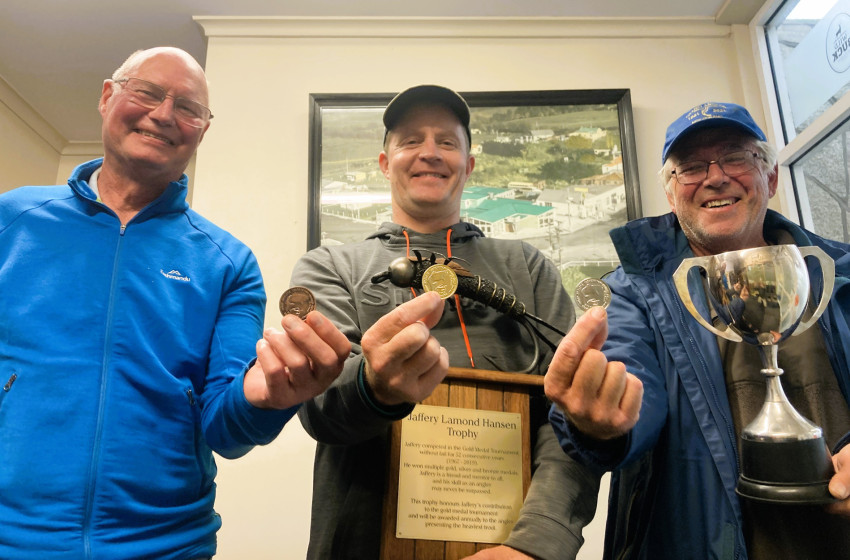Tough day on Waipahi – but it all helps for research
- Fresh Water
- 6/11/2023

Pictured: Displaying their medals and trophies at the weigh-in at Clinton at the weekend (Saturday, November 4) are (from left) Bruce McGavin (bronze), Matt Pettersson (gold) and Les Gibson (silver). Photo: Bruce Quirey, Otago Fish & Game.
Otago Fish & Game is collecting otoliths (ear bones) from competitions like the historic Waipahi Gold Medal to continue research into where brown trout spend their lives in the lower Clutha catchment.
The research is helping Fish & Game to identify and manage important spawning streams in this catchment.
However, last weekend’s conditions didn’t make it easy.
Matt Pettersson earned back-to-back titles in tough conditions in the historic 140th Waipahi Gold Medal fly-fishing competition in South Otago.
“I knew it was going to be a streamer and nymph day,” the Invercargill angler said after claiming his second gold medal.
Anglers contested in their fixed beats along the Waipahi River, which was running high and dirty.
Pettersson landed three of a total of only seven trout caught by the 25 contestants in what organisers believe was the second-lowest catch rate in the event’s long history.
“Conditions were pretty tough,” Pettersson said. “I mean the river was dirty although it cleared a wee bit it through the day.
“It was very methodical fishing, just hitting the edges. I drifted a streamer with a nymph trailing it all day, and I got all three fish on the nymph.”

Above: Brown water from a creek chugs into the Waipahi River on competition day.
Downriver, the level rose during the day as heavy rain and hail tested anglers’ skills to the limit.
Pettersson also caught the heaviest fish of the day, claiming the Jaffray Lamond Hansen Trophy.
Otago Anglers Association president Mark Barrett said the Waipahi Gold Medal was believed to be the longest-running fishing competition in the southern hemisphere.
The competition was originally held on the Shag River in its early years and as trout were introduced throughout the South Island it moved to the Waipahi River where the event had been held for the majority of the time.
“As current managers of the competition, we’re just stewards,” Barrett said. “We try to keep it fun and social without being too serious while still having that edge of competition.”
Win, lose or draw, most entrants enjoyed the event, having a beer and meal at the end of the day, and the raffle was always a highlight, he said.
“You know you’ve been to the Waipahi Gold Medal when you come home with a couple of boxes of porridge.”
Organisers would like to see some new faces join the competition, Barrett said. Past participants got the first opportunity to participate before the invitation was sent to the broader public.
One of the things that made the competition enjoyable was each angler got a limited section of the river, he said.
“You really have to put in all your skills regardless of the conditions on that section. You have no choice but to make the best of what the river offers you that day.”
Every year, one section of the river generally fished better than others, and this year it was the top because it was a little clearer, he said.
“But it doesn’t matter what beat you get. You still have to catch the fish.”